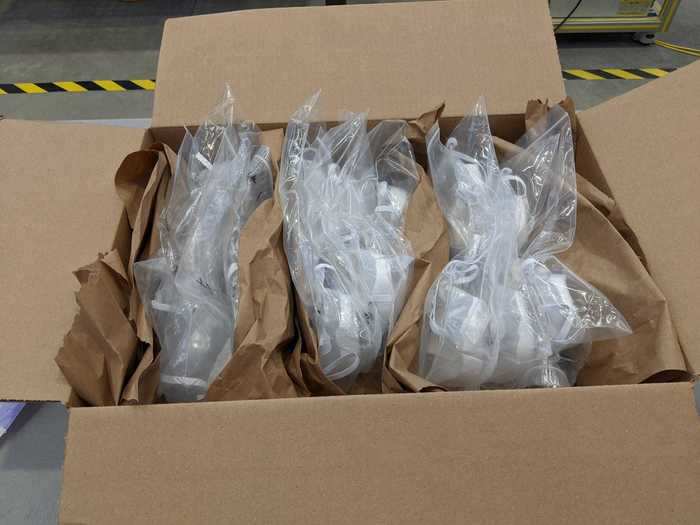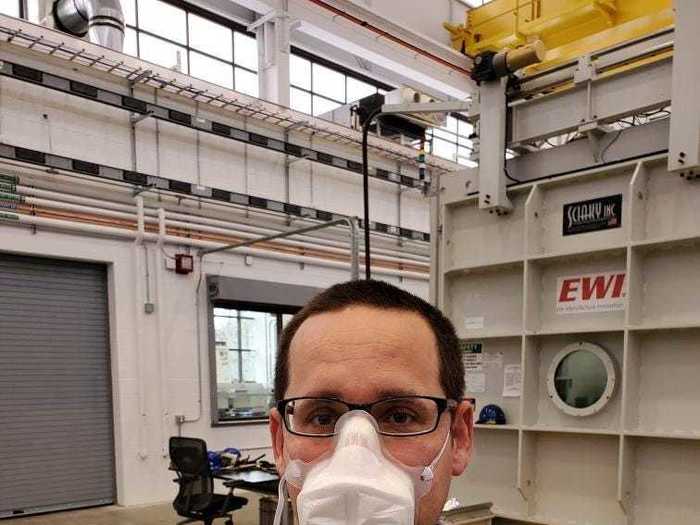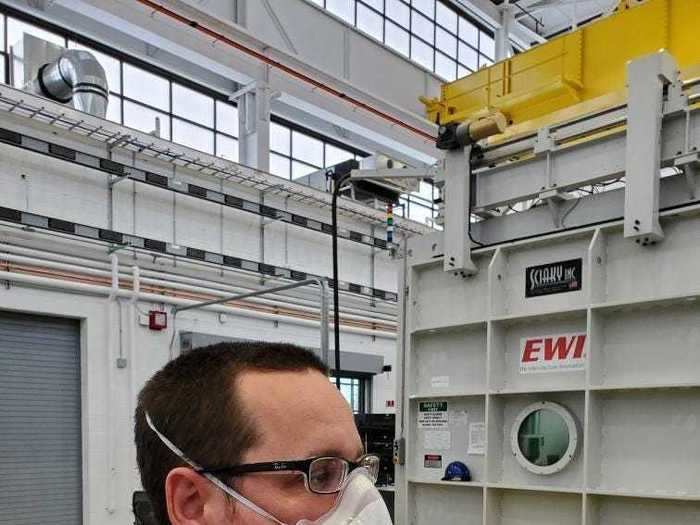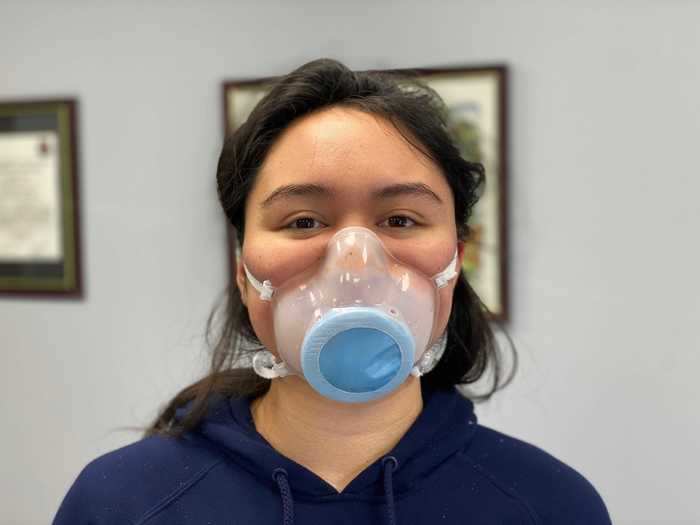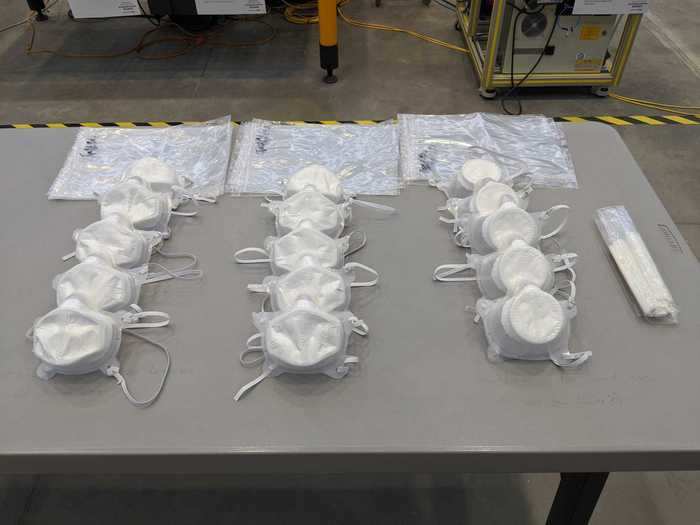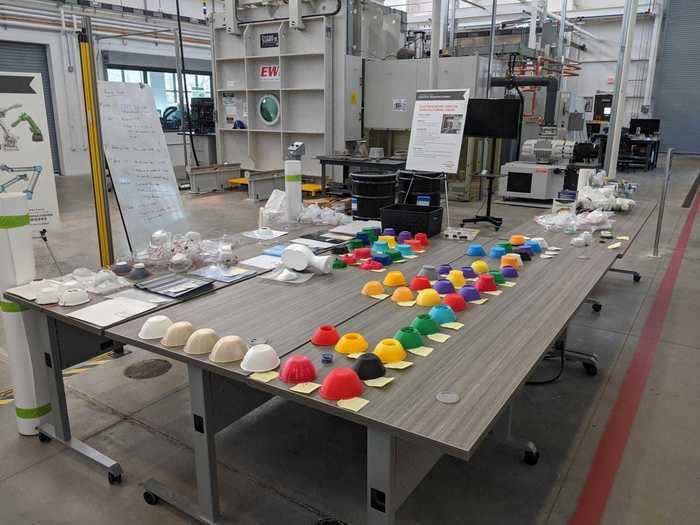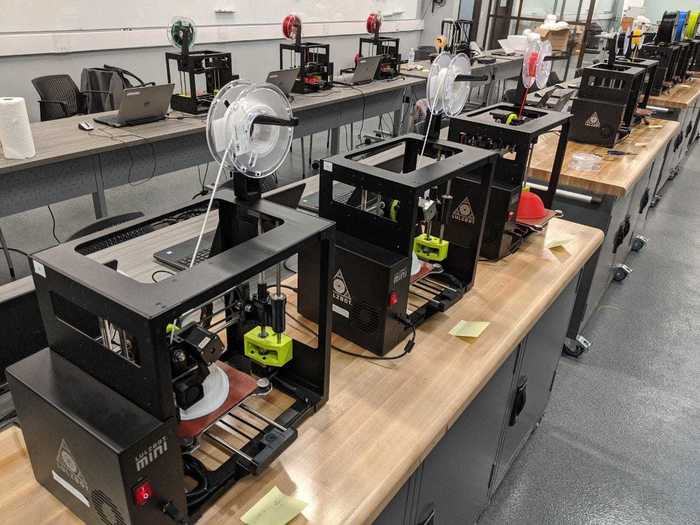A Building Momentum employee wearing one of the masks.Building Momentum
- The coronavirus crisis has prompted many companies and individuals to pivot their businesses or start new companies to help those in need.
- Building Momentum, a training organization based in Alexandria, Virginia, saw its business grind to a halt when the crisis hit: Its employees couldn't travel or host in-person trainings, and it couldn't host events at its headquarters.
- The team decided to pivot to helping reduce equipment shortages, connecting with a Buffalo, New York-based team at manufacturing R&D organization EWI and embarking on a new design for a reusable filter mask.
- The teams, which have never met in person, went from an idea to a viable prototype in six days. They created a mask made from thin plastic than can be sanitized in a dishwasher and reused. The mask has an interchangeable filter, which means the user can swap in the right filter depending on their needs.
- The teams hopes the design will help "back-fill" shortages for workers who need protection on the job, but who don't necessarily require the same level of filtration that an N95 mask provides.
- The mask design hasn't been approved yet by the Food and Drug Administration, but 1,000 of the masks are currently being tested at eight Air Force bases across the country.
- Visit Business Insider's homepage for more stories.
Many small businesses across the country can point to a day in March when everything ground to a halt. For Virginia-based training organization Building Momentum, that day was March 11.
The company, which trains corporate clients as well as members of the US military, was hosting in-person trainings at its headquarters in Alexandria, traveling abroad for trainings, and hosting events like community gatherings, holiday parties, and weddings. As the virus spread, none of those aspects of Building Momentum's business were viable anymore.
"All of our work immediately stopped across all of our silos," Allen Brooks, chief operating officer of Building Momentum, told Business Insider. "It was completely frozen."
The company, which employs 19 people, immediately shifted its focus to figure out what it was uniquely equipped to do to help. It spawned a collaboration that stretches from Northern Virginia to Western New York, combining Building Momentum's problem-solving talent with manufacturing R&D organization EWI's technological know-how.
The partnership has resulted in a new type of reusable mask with an interchangeable filter, with the aim of alleviating personal protective equipment shortages nationwide, not just for frontline medical workers, but for any type of worker who will need protection on the job.
"A lot of N95 masks that are going, rightfully, to ICUs, but now you have all these medical procedures, and first responders and other users, that need to have access to a durable, reusable mask," Jay Long, a consultant who connected Building Momentum with the team at EWI, told Business Insider.
Here's how the project developed, and what makes the mask different from others out there.
Read the original article on
Business Insider
Given that the mask design is open-source, neither company is making money from mask sales. Instead, both businesses are staying afloat through other means.
A supply of masks ready for shipment.
EWI
EWI is still generating revenue from its other client projects while a core group of employees focuses on the mask project. Building Momentum is relying on grants, from the city of Alexandria and the Air Force, and was an early recipient of a Paycheck Protection Program loan. The company is also starting to move some of its trainings to video calls in hopes to restart that aspect of its business.
But Brooks said most of his days now are spent on the phone, trying to find people and money who can support the company's projects.
"This is how I keep 19 people employed," Brooks said. "We shift hard when we're faced with a problem."
The mask is now available on the National Institute of Health's 3D Print Exchange, an open-source site that has a range of vetted PPE designs anyone can use and print.
EWI
Neither Building Momentum nor EWI is equipped to mass-produce masks. The Building Momentum team was able to produce 1,000 masks for the Air Force in two days, and Brooks said it has the capacity to scale up to hundreds of thousands of masks, but that it would likely take too long with the limited staff and space it has.
EWI is in a similar position. It's partnered with a professional vacuum-forming line to create 1,000 mask shells and is encouraging other manufacturers to work together to compile the other parts for a mask kit. The team estimates that anyone looking to manufacture the mask shell can produce 1,000 in four hours for less than $0.50 per shell.
"Our intent was not to manufacture them in large quantities at our facilities," EWI's Malloy said. "Our plan was to get this out to people that can do it the best and help them get up to speed very quickly instead of them going through a six-month or year-long learning curve."
Both organizations have masks out for testing in their communities.
Malloy wearing a BMW-produced mask.
EWI
Because of Building Momentum's ties to the military, the company was able to secure a grant from the the Air Force, which took 1,000 masks to evaluate at eight Air Force bases around the country. And the EWI team was able to get the masks in the hands of the VA hospital, which it said has been evaluating the masks as well.
The mask design hasn't been approved by the Food and Drug Administration yet. The teams hope it will be approved soon under the FDA's Emergency Use Authorization guidelines, which would allow for an unapproved medical device like the mask to be used to help prevent the spread of the coronavirus.
The teams have also been testing the effectiveness of the masks themselves — the EWI team built a physical test system at Buffalo Manufacturing Works to test how well certain materials prevent particles from getting through, as well as how breathable those materials are.
The team has performed qualitative fit testing, a lab test that checks the seal of the mask, and it's waiting on quantitative fit testing, a more rigid test of how well the mask filters out particles.
What makes the mask different from a traditional N95 mask is the interchangeable filter.
A Building Momentum employee wearing one of the masks.
Building Momentum
Both the EWI and Building Momentum teams noted that the changeable filter provides two key advantages: reusability and flexibility.
Once you're done using the mask for a period of time, you can throw away the filter and sanitize the rest of the mask for the next time you need it. And the interchangeable filter works well for people who either don't need N95-level filtration or can't wear an N95 mask for long periods of time.
"If you are a front-facing COVID healthcare worker, then you can put in an N95-compliant filter material and go to work," Brooks from Building Momentum said.
"But if you're an ambulatory care clinic worker or you work in the billing department of a hospital or you're a roadside worker for a municipality, you can use these masks so that all of those N95s that are so critical right now — that we need to reserve the stock of for our healthcare workers — we can protect that stock by back-filling all of the rest of the uses of face masks with our mask," Brooks said.
The group settled on a type of technology called vacuum-forming for the mask. The masks are made out of a thin, 3D-printed plastic — similar to plastic used for ketchup bottles — then heated and stretched over a mold.
EWI
The plastic — known as low-density polyethylene, or LDPE — is advantageous for a face mask because of its flexibility.
"Unlike having a hard, rigid piece of plastic, this forms to your face really well when you wear it," Malloy said.
Some of the healthcare professionals EWI spoke with about the mask emphasized a tight fit to the face as being crucial — if it leaks, it's not going to be useful. They also noted that they liked that the plastic was transparent, since it would allow doctors and nurses to see through the mask if a patient was wearing it.
The shell of the mask is reusable, and since it's made out of a non-porous plastic, it can be sanitized in the dishwasher or washing machine.
The full group working on the mask has never met in person — both teams would work on a design separately, come back together to share what they created, decide on the best design, then move on to the next step. The mask went from an idea to a viable prototype in six day.
Mask prototypes at Buffalo Manufacturing Works.
EWI
Working like this can be "really strange if you've never met each other and only met on a random Friday phone call," Nadine Hartrich, who runs business development for EWI, told Business Insider.
But ultimately, having a shared mission made the partnership work — and quickly.
"You always want to have a sense of urgency in your work, but this was like, we have to figure it out because it could potentially save lives," Hartrich said.
For EWI, which runs a site called Buffalo Manufacturing Works in Buffalo, New York, the decision to help with the mask shortage evolved in a matter of hours.
Buffalo Manufacturing Works' cache of 3D printers.
EWI
"The day that things really started to go south in New York, when it really hit home that this is serious, we had just shut the doors on our facility and had everybody leave," Matt Malloy, a project engineer at Buffalo Manufacturing Works, told Business Insider.
"But we decided internally, because we have a lot of manufacturing capability on site, particularly a lot of 3D-printing capabilities, that we were just going to get everything up and running and ready to go so that we could help out as-needed," Malloy said.
The phone call to help arrived within a matter of hours, when Long connected the two teams from two different states who wanted to put their expertise to use. Within days, 15 people from EWI and Building Momentum's 19 employees were collaborating on the project.

